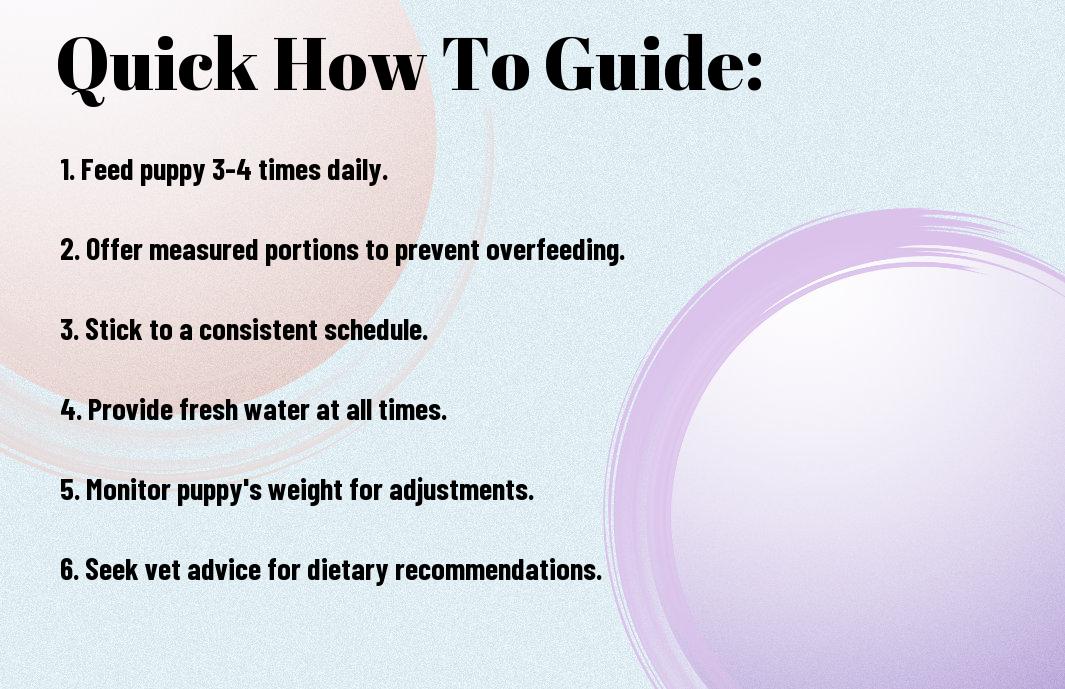Feeding your 8-week-old puppy can be a crucial task in setting up a healthy routine for your furry friend. Establishing the right feeding schedule early on is important for their development. In this guide, we’ll walk you through how to ensure your puppy’s feeding schedule is on point at 8 weeks old, providing them with the nutrition and structure they need for a happy and healthy start.

Key Takeaways:
- Importance of a Consistent Feeding Schedule: Having a set feeding schedule helps regulate your puppy’s digestion and promotes healthy eating habits.
- Frequency of Meals: At 8 weeks old, puppies should be fed 3-4 times a day to meet their high energy and nutritional needs.
- Adjusting Portion Sizes: It’s important to monitor your puppy’s growth and adjust portion sizes accordingly to ensure they are getting the right amount of food.
- Quality of Food: Choose a high-quality puppy food that meets their specific nutritional needs, supporting their overall health and development.
- Monitoring Water Intake: Make sure your puppy has access to fresh water at all times to prevent dehydration and support proper hydration.

Understanding Your Puppy’s Nutritional Needs at 8 Weeks Old
Factors Affecting Nutrient Requirements
While your puppy is 8 weeks old, it’s crucial to understand the factors that can affect their nutrient requirements. Factors such as breed size, growth rate, activity level, and overall health play a significant role in determining the amount and type of nutrients your puppy needs to thrive.
- Ensure your puppy’s food is formulated for puppies specifically.
- Consult with your veterinarian to adjust the feeding schedule based on your puppy’s individual needs.
Perceiving and addressing these factors will help you tailor your puppy’s feeding schedule and ensure they receive the right balance of nutrients for optimal growth and development.
Importance of Balanced Nutrition
With your puppy being at a crucial stage of growth and development, providing balanced nutrition is imperative for their overall well-being. A diet that is rich in protein, fats, carbohydrates, vitamins, and minerals will support healthy bone development, muscle growth, and cognitive function in your puppy.
Even slight deficiencies or excess of certain nutrients can have a significant impact on your puppy’s health and development. That’s why it’s important to choose a high-quality puppy food that meets all their nutritional requirements.
Another
Another crucial aspect of balanced nutrition is ensuring your puppy maintains a healthy body condition. Overfeeding or underfeeding can lead to obesity or stunted growth, both of which can have long-term effects on your puppy’s health. By providing the right balance of nutrients and monitoring your puppy’s body condition, you can help them grow into a healthy and happy adult dog.
How to Determine the Right Feeding Schedule for Your Puppy
There’s nothing more important than ensuring your puppy receives the proper nutrition at this crucial stage of development. Creating a feeding plan tailored to your puppy’s needs is vital to their growth and well-being. Here are some tips to help you establish a feeding schedule that works for your 8-week-old puppy:
Tips for Creating a Feeding Plan
- Consult your veterinarian to determine the best type of food for your puppy.
- Divide your puppy’s daily food requirement into multiple small meals throughout the day.
- Monitor your puppy’s weight and adjust the feeding schedule accordingly.
After following these tips, you can ensure that your puppy is getting all the nutrients they need for healthy growth and development.
Calculating the Correct Amount of Food
Schedule regular weigh-ins for your puppy to track their growth progress and adjust their food portions accordingly. With an accurate measurement of your puppy’s weight, you can calculate the right amount of food they need at each feeding. It’s vital to follow the guidelines on the puppy food packaging and consult your vet to determine the correct portion size based on your puppy’s age, weight, and breed.
Scheduling Feedings for Optimal Growth
Now that you have determined the right amount of food for your 8-week-old puppy, it’s time to establish a feeding schedule that promotes optimal growth and development. Feed your puppy at consistent times each day to help regulate their digestion and establish a routine. Avoid overfeeding or free-feeding, as this can lead to weight gain and other health issues. By sticking to a feeding schedule, you can ensure that your puppy is getting the nutrition they need without overeating.
Factors to Consider When Creating a Feeding Schedule
For a healthy and happy puppy, it is crucial to consider various factors when creating a feeding schedule. These factors will help ensure that your puppy receives the appropriate nutrition at the right time, promoting optimal growth and development.
Breed-Specific Nutritional Needs
Consider your puppy’s breed when determining their nutritional needs. Different breeds have varying requirements for nutrients such as protein, fats, and vitamins. Some breeds may be prone to specific health issues that can be managed through a tailored diet. Consulting with your veterinarian can help you understand your puppy’s breed-specific nutritional needs and choose the right food accordingly.
The size and growth rate of your puppy will play a significant role in determining their feeding schedule. Large breed puppies have different growth patterns compared to small breed puppies, and their nutritional requirements may vary. It is vital to adjust the amount and frequency of meals based on your puppy’s size and growth rate to prevent health issues such as obesity or malnutrition.
Puppy Size and Growth Rate
Needs
Growth spurts and developmental stages require specific nutritional support for your puppy. During these periods, your puppy may need more calories and nutrients to support their rapid growth. Adjusting their feeding schedule to accommodate these increased needs will help them develop properly and maintain a healthy weight. Monitoring your puppy’s growth rate and consulting with your vet can help you make necessary adjustments to their feeding routine.
Energy Level and Activity
Consider your puppy’s energy level and activity when creating their feeding schedule. Puppies that are more active or have high energy levels may require additional calories to support their lifestyle. Providing them with the right balance of nutrients and energy through their diet will ensure they have the fuel they need to stay healthy and playful. You can adjust the portion sizes and feeding times based on your puppy’s activity level to keep them satisfied and energized throughout the day.

Common Feeding Mistakes to Avoid at 8 Weeks Old
Overfeeding and Underfeeding
To ensure your puppy’s health and well-being, it’s crucial to avoid overfeeding or underfeeding. Overfeeding can lead to obesity, digestive issues, and other health problems in your growing pup. On the other hand, underfeeding can result in stunted growth, lack of energy, and nutritional deficiencies. It’s imperative to follow the recommended feeding guidelines provided by your veterinarian or breeder to prevent these issues.
Inconsistent Feeding Schedules
Overfeeding at one meal and underfeeding at the next can disrupt your puppy’s digestive system and lead to irregular bowel movements. It’s important to establish a consistent feeding schedule to help regulate your puppy’s hunger and prevent overeating. Skipping meals or feeding at irregular times can also affect your puppy’s overall behavior and training progress.
Consistency is key when it comes to feeding your 8-week-old puppy. Set specific meal times and stick to them to create a routine that your puppy can rely on. This will also help with potty training as you can predict when your puppy will need to go outside based on their feeding schedule.
Ignoring Individual Puppy Needs
Every puppy is unique, and their nutritional requirements may vary based on factors like breed, size, and activity level. Ignoring these individual needs can lead to health issues such as malnutrition or obesity. It’s imperative to consult with your veterinarian to determine the right type and amount of food for your specific puppy.
Underfeeding
If you notice that your puppy is not gaining weight or lacks energy, you may be underfeeding them. It’s important to monitor your puppy’s growth and behavior to ensure they are receiving enough nutrients to support their development. Adjusting their feeding portions or switching to a higher-calorie diet may be necessary to meet their individual needs.
This personalized approach to feeding will help you provide optimal nutrition for your 8-week-old puppy and set them up for a healthy future. By avoiding these common feeding mistakes, you can ensure that your puppy grows into a strong and vibrant adult dog.
How to Monitor Your Puppy’s Progress and Adjust the Feeding Schedule
Tracking Weight and Growth
Keep a close eye on your puppy’s weight and growth to ensure they are developing at a healthy pace. Weigh your puppy regularly and track their growth on a growth chart provided by your veterinarian. This will help you monitor if your puppy is gaining weight appropriately.
Recognizing Signs of Nutrient Deficiencies
Your puppy may show signs of nutrient deficiencies if they are not getting the proper balance of nutrients in their diet. Watch out for symptoms like dull coat, lack of energy, or digestive issues. If you notice any of these signs, consult your veterinarian to address any potential nutrient deficiencies.
One common sign of nutrient deficiencies in puppies is stunted growth or delayed development. If you notice that your puppy is not growing at the expected rate for their age, it could be an indication that they are lacking imperative nutrients in their diet.
Making Adjustments to the Feeding Plan
With guidance from your veterinarian, you may need to make adjustments to your puppy’s feeding plan. Weight gain or loss, activity level, and overall health can all impact the amount and type of food your puppy needs. Monitor your puppy’s body condition score and consult with your vet to determine if any changes are necessary.
Weight fluctuations, changes in appetite, or digestive issues may signal that your puppy’s feeding schedule needs to be adjusted. Your veterinarian can provide recommendations on how to modify the feeding plan to best meet your puppy’s nutritional needs and support their growth and development.

Tips for Managing Mealtime and Reducing Stress
Once again, establishing a solid feeding schedule and routine will help your puppy feel more secure and reduce mealtime stress. Here are some tips to help you manage mealtime effectively:
- Puppy Feeding Fundamentals: Start by familiarizing yourself with the basics of puppy feeding to ensure you are providing your little one with the right nutrition at the right time.
Establishing a Calm Feeding Environment
Even at 8 weeks old, your puppy can benefit from a calm and quiet feeding environment. Choose a designated spot for mealtime that is free from distractions and noise. This will help your puppy focus on eating and prevent mealtime anxiety.
Minimizing Distractions During Meals
Now, it’s crucial to minimize distractions during your puppy’s meals. This means feeding your puppy in a quiet area away from high-traffic zones in your home. Turn off the TV, and keep other pets at bay while your puppy eats. Minimizing distractions will allow your puppy to concentrate on their food and develop healthy eating habits.
Feeding your puppy at consistent times each day will also help regulate their digestive system and establish a routine that they can rely on. Any sudden changes to your puppy’s feeding schedule can lead to stress and digestive upset, so try to maintain a consistent routine as much as possible.
Conclusion
The feeding schedule you establish for your 8-week-old puppy plays a crucial role in their overall health and development. It is important to provide a consistent routine that includes high-quality puppy food and proper portions to support their growing bodies. Making sure to feed them the right amount, at the right times, will set the foundation for a healthy diet as they continue to mature.
Remember to consult with your veterinarian to ensure that your puppy’s feeding schedule meets their specific needs. With proper care and attention to their nutritional requirements, you can help your furry friend thrive and enjoy a happy and healthy life by providing the best possible start in their formative weeks.
FAQ
Q: What should my 8-week-old puppy’s feeding schedule look like?
A: At 8 weeks old, your puppy should be fed 3-4 times a day with a high-quality puppy food specifically designed for their age and size.
Q: How much food should I feed my 8-week-old puppy at each meal?
A: Follow the guidelines on the puppy food packaging, but typically, a 8-week-old puppy should be fed about 1/4 to 1/2 cup of food per meal.
Q: Is it important to stick to a consistent feeding schedule for my puppy?
A: Yes, it is important to establish a consistent feeding schedule to help regulate your puppy’s digestion and potty habits.
Q: Can I free-feed my 8-week-old puppy?
A: It is not recommended to free-feed a puppy as it can lead to overeating and weight issues. Stick to a regular feeding schedule instead.
Q: What do I do if my puppy is not eating all of their food at meal times?
A: Monitor your puppy’s appetite and consult with your veterinarian if they consistently refuse to eat. It could be a sign of an underlying health issue.
Q: Is it okay to give my 8-week-old puppy treats between meals?
A: It is fine to give your puppy small, healthy treats as rewards, but be mindful of not overfeeding and consider the treats in their overall daily caloric intake.
Q: How can I tell if my puppy is getting the right amount of food?
A: Monitor your puppy’s body condition – you should be able to feel their ribs but not see them protruding. Consult your vet if you’re unsure about your puppy’s feeding habits.

Leave a Reply